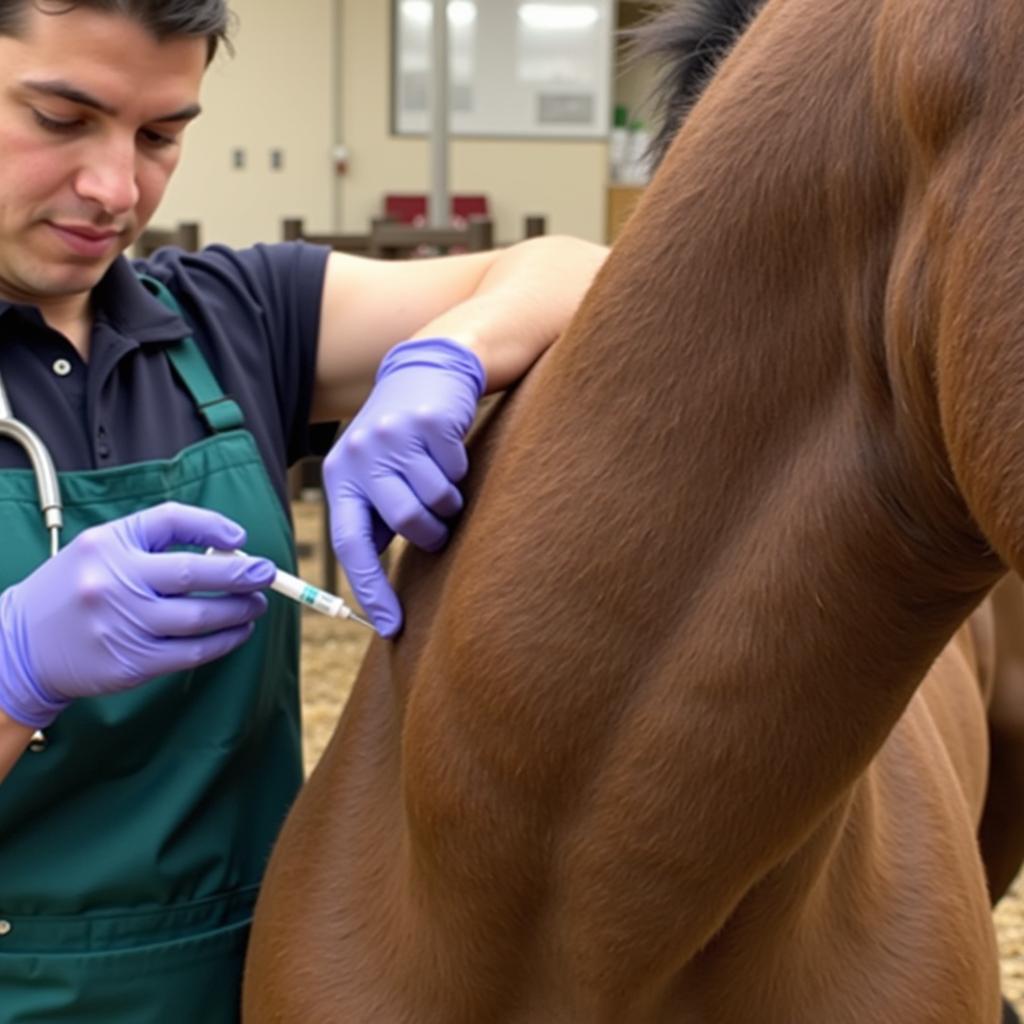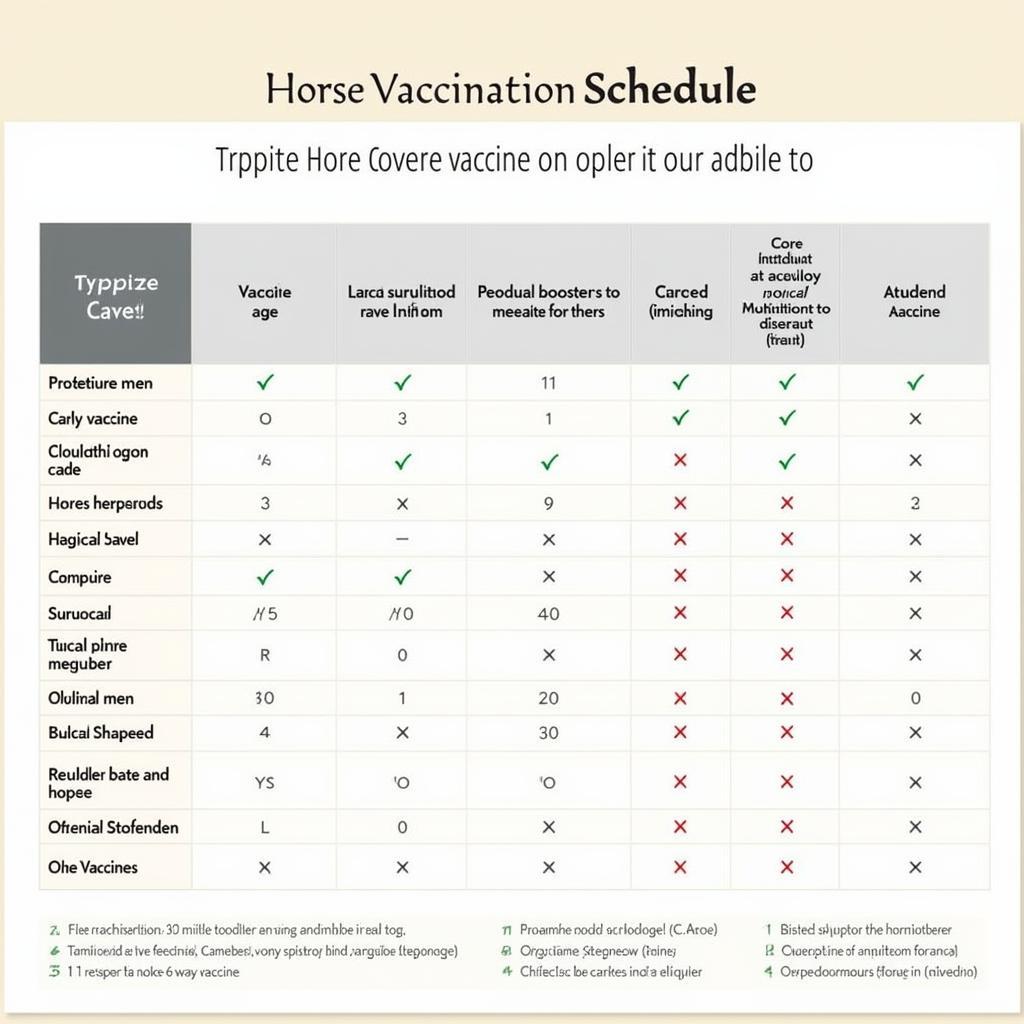The 6-way vaccine for horses, also known as the 5-way plus rabies, is a crucial aspect of equine healthcare. It protects against six deadly diseases: tetanus, eastern and western equine encephalomyelitis (EEE/WEE), West Nile virus (WNV), equine influenza, and rabies. This comprehensive vaccination is essential for maintaining your horse’s well-being and preventing potentially devastating illnesses.
Delving into the Importance of the 6-Way Vaccine for Horses
This vaccine provides comprehensive protection by targeting six major equine diseases. These diseases can range from debilitating neurological conditions to highly contagious respiratory illnesses. By vaccinating your horse, you are significantly reducing the risk of these diseases, ultimately contributing to a longer, healthier life for your equine companion. Not only does it protect individual horses, but widespread vaccination also helps create herd immunity, minimizing the spread of these diseases within the equine population. Choosing the 6-way vaccine for horses is an investment in their health and future.
 Administering the 6-way vaccine to a horse
Administering the 6-way vaccine to a horse
Breaking Down the Components of the 6-Way Vaccine
The 6-way vaccine protects against the following diseases: Tetanus, a bacterial infection causing painful muscle spasms; Eastern and Western Equine Encephalomyelitis (EEE/WEE), mosquito-borne viral infections causing inflammation of the brain and spinal cord; West Nile Virus (WNV), also mosquito-borne, affecting the nervous system; Equine Influenza, a highly contagious respiratory disease; and Rabies, a viral infection affecting the nervous system and transmissible to humans. Each component plays a critical role in safeguarding your horse’s overall health.
Why is the 6-way Horse Vaccine So Important?
The 6-way vaccine for horses is so important because it provides broad-spectrum protection against a range of serious diseases. These diseases can cause severe illness, long-term health problems, and even death in horses. Vaccinating your horse not only protects them but also contributes to the overall health of the equine community by preventing the spread of these diseases. You can find more information about the importance of vaccinations on our page discussing what shots do horses need.
Understanding the Vaccination Schedule for the 6-Way Vaccine
The initial 6-way vaccine for horses is typically given in a series of injections, followed by annual boosters. Your veterinarian can determine the best vaccination schedule for your horse based on age, risk factors, and local disease prevalence. For more specific information regarding the five way vaccine, you can visit our page dedicated to the five way horse vaccine. It’s vital to maintain a regular vaccination schedule to ensure optimal protection.
 Example vaccination schedule chart for horses
Example vaccination schedule chart for horses
What are the Common Side Effects of the 6-Way Vaccine?
Some horses may experience mild side effects after receiving the 6-way vaccine, such as localized swelling or stiffness at the injection site, low-grade fever, or temporary lethargy. These side effects are generally short-lived and resolve on their own. However, if you notice any unusual or concerning symptoms, consult your veterinarian immediately. Learn more about potential signs of tetanus in horses by visiting our dedicated page on tetanus in horses signs.
“Regular vaccination is the cornerstone of preventative equine healthcare,” says Dr. Amelia Shepherd, DVM, specializing in Equine Medicine and Surgery. “The 6-way vaccine offers critical protection against a range of potentially devastating diseases. I advise all horse owners to discuss their horse’s individual needs with their veterinarian to develop an appropriate vaccination plan.”
Protecting Your Horse: The Significance of the 6-Way Vaccine
The 6-way vaccine for horses is a fundamental aspect of responsible horse ownership. By providing protection against six significant equine diseases, it significantly contributes to the long-term health and well-being of your horse.
“The peace of mind that comes from knowing your horse is protected against these preventable diseases is invaluable,” adds Dr. Shepherd. “Proactive healthcare, including regular vaccinations, is the best way to ensure your horse enjoys a long and healthy life.” You can further understand the importance of vaccination by researching the 5 way vaccine horse. Another important vaccine to consider is the one for botulism in horses vaccine.
In conclusion, the 6-way vaccine for horses is a vital investment in your horse’s health, offering crucial protection against six potentially devastating diseases. Consult your veterinarian to determine the best vaccination protocol for your horse and ensure their long-term health and well-being.
FAQ:
- What diseases does the 6-way vaccine protect against?
- How often should my horse receive the 6-way vaccine?
- Are there any potential side effects of the 6-way vaccine?
- What should I do if my horse experiences a reaction to the vaccine?
- Can I vaccinate my pregnant mare?
- Where can I get more information about equine vaccines?
- Why is it important to vaccinate my horse even if they don’t leave the property?
Need assistance? Contact us 24/7: Phone: 0772127271, Email: [email protected], or visit us at QGM2+WX2, Vị Trung, Vị Thuỷ, Hậu Giang, Vietnam.